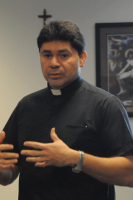Solidarity will end global poverty and injustice

DRAPER — Father Juan Molina, OSST, was doing an internship for Catholic Relief Services (CRS) in Zimbabwe while pursuing a doctoral degree in economics at Fordham University in New York City when he started to doubt he was missionary material.
“I arrived there in January. By Holy Week I was tired, depressed, alone, and questioning if this was the life of a missionary. On Easter Vigil, among the adults who were there to be baptized and confirmed was a lady about 80 years old. I imagine she had lived without any knowledge of the Church, but here she was about to find life at an age when many think they will find death. She was there to find life in the Church, life in God. This made me remember why I am a priest,” said Fr. Molina.
A native of El Salvador, Fr. Molina is no stranger to poverty. However, the levels of poverty in the African country overwhelmed him and the level of faith of the Zimbabwean people amazed him. This experience also made him come to a realization.
“Latin America is not poor. It has poor thoughts. We have enough (resources) to live but we don’t share them,” he said.
The same could be said about global poverty because we do have enough to feed, clothe and educate the entire world. Thus, the lack of material things is not the cause of poverty.
“Poverty is an environment, a structure with different aspects that not only include economic issues but also social, moral and spiritual issues,” he said.
In 2006, Fr. Molina started working for CRS as the advocacy program coordinator for the southwest region of the United States. Part of his job was to be in the field addressing the root causes of global poverty by educating people and galvanizing them to advocate for human development, health, education and social projects.
Fr. Molina was recently named advisor of Latin-American and global trade for the Office of International Justice and Peace for the United States Conference of Catholic Bishops (USCCB) and said his experience at CRS will be very useful.
“The job will be very similar. But in the conference my (job) will be more abstract, where we are the ones making a policy. We give direction and shape to a policy,” he said.
Still, a policy without implementation serves no purpose. Pope Benedict XVI said to Catholics in his latest Encyclical Letter, Caritas Veritate, that “through support for economically poor countries by means of financial plans inspired by solidarity… not only can true economic growth be generated, but a contribution can be made toward sustaining the productive capacities of rich countries that risk being compromised by the crisis.”
But the difficult economic situation in the United States has made many Americans hesitant to cooperate abroad when faced with the dilemma: Should I help that country or my own?
“The truth is we are in the same ship. If one part of the world suffers and degrades the planet, it affects us. We have to take care of the world. The Bible says that whoever receives the most has to give the most,” he said.
In a world where an estimated 1.4 billion people live in extreme poverty on $1.25 per day, the U.S. is the richest country and the largest provider of economic assistance, and it is also among the smaller providers in relative income.
“The USCCB wants the U.S. to increase its assistance,” said Fr. Molina.
With this in mind, the USCCB along with CRS has launched the Catholics Confront Global Poverty initiative, which is a nationwide effort to mobilize 1 million Catholics to pray, learn and act to end poverty.
“This goal might seem lofty but it is also a small goal… Catholics make up about 20 percent of the U.S. population, which means we are at least 40 million,” he said during his presentation at the Annual Diocesan Pastoral Congress that took place in Juan Diego Catholic High School in Draper on Oct. 10.
“Pope Benedict XVI said there are three pillars or essential elements in the Catholic faith,” said Fr. Molina. The pillars are proclamation of the Gospel, celebration of the sacraments and works of charity.
Fr. Molina said there are also many simple acts we can make to improve the economic situation here and around the world. We can buy fair trade products, for example.
“We don’t have to do it all the time,” said Fr. Molina aware that fair trade products are expensive, but we should buy them in order to set a trend that companies will notice and embrace.
“We should buy what we can to silence our conscience and make a difference because if we’re suffering, how much more are the poor suffering?” he said.
For more information visit www.usccb.org/globalpoverty.
© Copyright 2025 The Diocese of Salt Lake City. All rights reserved.

Stay Connected With Us